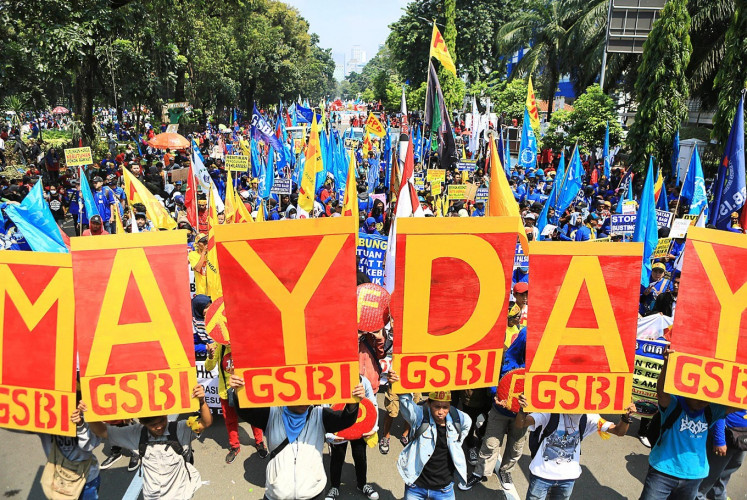Yudhoyono blames external factors for rising food prices
A recent rise in the prices of staple foods is the result of not only domestic factors, but also external ones amid a global economic slowdown, President Susilo Bambang Yudhoyono says
Change text size
Gift Premium Articles
to Anyone

A recent rise in the prices of staple foods is the result of not only domestic factors, but also external ones amid a global economic slowdown, President Susilo Bambang Yudhoyono says.
"Therefore, I expect people to understand that. Many statements from 'the elites' imply that the price rises are occurring only in Indonesia, while it is clear to see that the rises are happening globally," Yudhoyono said Thursday.
He said non-domestic factors for the rising prices included a surge in global oil prices, which reached a record high of US$101.32 per barrel on Wednesday and the U.S. credit crunch.
"The government will strive to stabilize the price of key staple foods, such as soybeans, flour, cooking oil and meat," said the President after a meeting with economic ministers.
The meeting was attended by Vice President Jusuf Kalla, Finance Minister Sri Mulyani Indrawati, Coordinating Minister for the Economy Boediono, Energy and Mineral Resources Minister Purnomo Yusgiantoro and Trade Minister Mari Elka Pangestu.
On Wednesday, hundreds of meat sellers demanded the government stabilize meat prices. They said the price of beef had recently gone up from Rp 45,000 (about $4.90) a kilogram to Rp 52,000.
Earlier this year, tofu and tempeh producers protested against the surging price of soybeans. The government responding by eliminating the import duty on soybeans, the key ingredient in tempeh and tofu.
Currently, most soybeans in the country are imported.
The government has said it will stabilize the prices of key staple foods, however, it is still waiting for the windup of the 2008 state budget revision, which is set to be submitted to the House of Representatives later this month.
The government, Yudhoyono said, could not implement its policy on stabilizing key staple food prices before the House endorsed the state budget revision.
In the revised budget, the government plans to eliminate the value added tax on wheat, flour and cooking oil to bring down the prices of these commodities.
The government has been forced to revise the state budget amid adverse global economic conditions.
On Wednesday, the U.S. central bank predicted the U.S. economy would grow only by between 1.3 and 2 percent this year, 5 percent less than its previous estimate.
If the government maintained the 2008 state budget, observers say, the country's economy could have collapses with subsidies for oil-based fuels and electricity rising to Rp 250 trillion, and, in compensation, the subsidies for key staple foods, health and education being reduced.
To prevent that, the government will introduce a number of measures under the revised budget, such as limiting the consumption of oil-based fuels and promoting a switch from kerosene to liquid petroleum gas, said the President.
The government has predicted the country's economy will grow by 6.4 percent this year, down from an earlier estimate of 6.8 percent.









